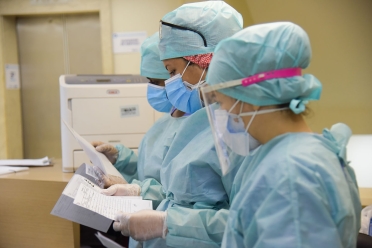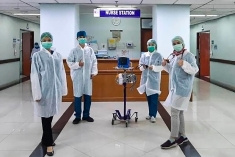 The public health system in Brazil, called the Unified Health System (SUS), established by the Federal Constitution of 19883, is universal and funded by the Union, the States, the Federal District and the Municipalities budgets. This assures the right to free access for the 211,755,692 inhabitants ranging from primary care to complex procedures, vaccines and medications for the treatment of several diseases, such as diabetes, arterial hypertension, asthma, HIV, Alzheimer, tuberculosis, leprosy, among others. In addition, SUS finances research in the epidemiology area and inspects the food quality offered in commercial establishments through the Brazilian Health Regulatory Agency (ANVISA). SUS represents a significant achievement for the universal right to health in Brazil and nursing care plays a major role in responding to the population's health needs. Moreover, within the SARS-CoV-2 pandemic scenario, nursing professionals have been even more highlighted.
The public health system in Brazil, called the Unified Health System (SUS), established by the Federal Constitution of 19883, is universal and funded by the Union, the States, the Federal District and the Municipalities budgets. This assures the right to free access for the 211,755,692 inhabitants ranging from primary care to complex procedures, vaccines and medications for the treatment of several diseases, such as diabetes, arterial hypertension, asthma, HIV, Alzheimer, tuberculosis, leprosy, among others. In addition, SUS finances research in the epidemiology area and inspects the food quality offered in commercial establishments through the Brazilian Health Regulatory Agency (ANVISA). SUS represents a significant achievement for the universal right to health in Brazil and nursing care plays a major role in responding to the population's health needs. Moreover, within the SARS-CoV-2 pandemic scenario, nursing professionals have been even more highlighted.
Since the confirmation of the first positive case of COVID-19 in Brazil on 26 February, 2020, the work routine of many health professionals has changed due to the emergency in caring for the infected and in containing the spread of the virus.4 Among these, the nursing team, which includes technicians and nurses, represents the largest percentage of the health workforce with approximately two million professionals working in four major areas: direct patient care, management, teaching and research.
Preparing for the unknown is an arduous task, especially when we refer to nurses who provide direct care to patients suspected or infected with SARS-CoV-2. Therefore, with regard to nursing care, from primary care settings to those with higher technological density, nursing professionals have taken the lead and appropriated a decisive role in evaluating their own competence, attitudes and skills to offer safe care to the patient and their team, which culminated in training and daily adaptations through protocols and institutional flows that promoted changes in the routines of the various Brazilian health services5.
Managers, frontline professionals and class councils came together to urgently develop a strategic plan for coping with COVID-19 and healthcare for nursing professionals. Training was carried out using technology and simulation scenarios for appropriate attire and care for the COVID-19 victim; changes in the hospitals physical structure and emergency care for isolation of infected patients, as well as the implementation of field hospitals, with exclusive care for patients with the disease; the suspension of face-to-face assistance and the migration to call centres.
However, nurses were not prepared to deal with the physical and psychological burden imposed by working conditions, distance from their families, the high number of deaths seen daily, in addition to the insufficient amount of health supplies and personal protective equipment. Many of these professionals also became infected, fell seriously ill and unfortunately many did not resist. There were approximately ten thousand infected nurses and 88 deaths by COVID-19 by May 2020.5 In fact, we are talking about a category which has in their essence the commitment to care and for that reason, is constantly faced with their fears, anxieties, anguish and has demonstrated resilience to be uninterruptedly alongside those who were vulnerable to the disease. Furthermore, many of them have participated voluntarily in the studies that have tested four types of vaccine in the country.
In addition, the care implemented by nursing professionals go beyond the individual, being also directed to the patient’s family and community. Regarding the family, nurses are often the professionals responsible for promoting virtual meetings between the hospitalised patient and their support network, providing guidance on care to interrupt intrafamily transmission, identifying new suspected cases of COVID-19 in close contacts as well as welcoming and listening to the family members who experience moments of anguish, fear and uncertainty when someone is hospitalised and cannot receive visitors. At the community level, the nurses are the ones who organise health surveillance actions in the search for symptomatic people and diagnosis in a timely manner and act, along with the multidisciplinary team, in orienting communities on biosafety measures with a view to mitigating the transmission of the new coronavirus. Besides that, nursing is the profession responsible for managing and carrying out the vaccination campaign against COVID-19. It is worth emphasising that care for patients affected by COVID-19 in SUS occurs simultaneously with actions implemented throughout the health-disease-care cycle for different clinical conditions, ranging from health promotion, primary and secondary prevention and rehabilitation. Thus, nurses act, in fact, as protagonists of care and health, either directly to patients or in management.
Another sector affected by the pandemic was education, which underwent adjustments to adapt to the new reality. In Brazil, nursing education is mostly made up of face-to-face courses with theoretical classes taught by professors in the classroom and internships in SUS health units. Nursing education in Brazil focuses on the SUS. Transformations occurring at a slow pace in most institutions, such as the virtualisation of learning processes, which became issues of top priority during the pandemic.
Given the need for preventive measures for the transmission of the new coronavirus, especially social isolation, professors and students migrated the teaching-learning processes to the digital environment in about 40 days and, with this, the already existing difficulties were expanded along with social inequalities, such as: the lack of access to the internet and computer network by students with low family income; difficulty in readjusting the family structure to allow the student to monitor remote activities, since many responsible for the household lost their jobs and the student found himself in the need to help with family income by doing some type of work; use of the same computer by many family members simultaneously; monitoring of teaching activities only by cell phone, with limited data packages; the professor's lack of preparation for handling technologies and strategies for remote teaching; difficulties in adjusting the professor's routine, which, in addition to teaching and research duties, those professors also had an increase in the daily workload for the performance of domestic chores, care and literacy of children.
During the health crisis of COVID-19 in the country and the valorisation of care on the “front line”, there is still a need for nursing to establish itself as a science when developing research that subsidises the practice through a body of knowledge itself and through dialogue with other areas of knowledge.
Despite all the difficulties presented here, it is possible to observe the continuity of the expansion of research based on evidence, the substantial growth of clinical studies and the number of professionals with master's, doctoral and post-doctoral courses. This growth has enabled research in the nursing field and the implementation of evidence in clinical practice.
Finally, it is a fact that currently, Brazilian nurses are often faced with several personal and professional challenges, having to deal with the risk of illness of their team, fear of their own death, colleagues and family members, increase the workday and the complexity of the work imposed by the clinical management of COVID-19.6 In spite of that, these professionals have demonstrated resilience and ethical commitment to society and continued their mission. Brazilian nursing, along with that of the other countries affected by COVID-19, will leave the historical awareness of the year 2020, its value and importance, in addition to helping to rethink the strategies of action in different fields, whether in teaching, research, assistance or management.
It is a time to resume what the precursor Florence Nightingale taught “Nursing is an art; and to carry it out as art, it requires an exclusive devotion, a preparation as rigorous as the work of any painter or sculptor”. It should be considered a profession of social practice, based on science, ethics and political and health action, essential to overcome the challenges that the present and the future bring to us. An indispensable professional for human life in society and which has the potential to reduce social inequities and engage collectively in adverse health situations.


 Our mission: To reduce the burden of cardiovascular disease.
Our mission: To reduce the burden of cardiovascular disease.